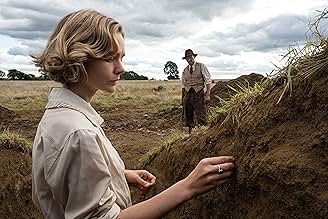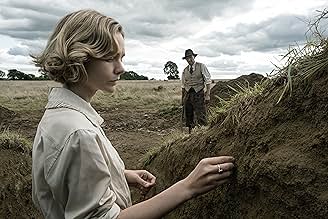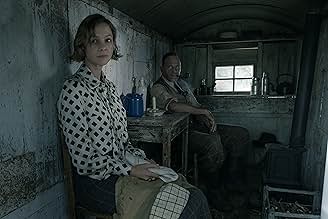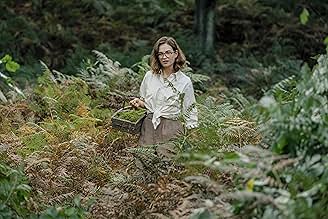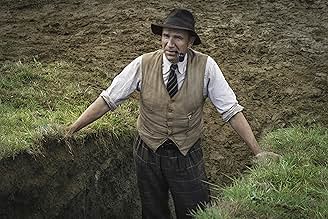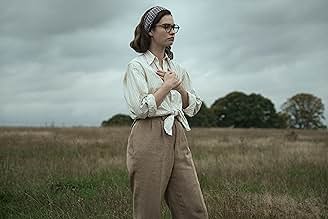An archaeologist embarks on the historically important excavation of Sutton Hoo in 1938.An archaeologist embarks on the historically important excavation of Sutton Hoo in 1938.An archaeologist embarks on the historically important excavation of Sutton Hoo in 1938.
- Nominated for 5 BAFTA Awards
- 3 wins & 11 nominations total
- Director
- Writers
- All cast & crew
- Production, box office & more at IMDbPro
7.187.9K
1
2
3
4
5
6
7
8
9
10
Featured reviews
Drama,War,And Relationships
This is a very good movie..if you see the picture from the outside you'll say it's a story about an Archeologist and his historically important excavation..but if you dig deeper you'll find a lot of potential in what the movie is trying to tell you.
The relationships between us and the people we love,the people we don't even know..heck between people in general and how it's important to a human being..but that comes with a misunderstandings and conflicts and this happening in a time of war and how that is affecting them..all this has been told in an amazing dramatic way of Brasil Brown who discovered and excavated one of the most important archaeological discoveries of all time of course with that being the main story.
The acting by Carey Mulligan was magnificent and Ralph Fiennes was the one for this role and their performance was the outstanding thing in the whole movie.
Another thing was good is the editing..they've done a tremendous job and it was really worth the effort to come up with something like this.
Although sometimes there are some side stories that you'll find yourself not that interested in them too much,and the storytelling could seem very slow at some points..also there's ups and downs like any other movie.
Overall great movie,worth watching and i suggest you to see it.
A Real Story
There is a lot I can say about this film, but I'll keep it short.
If you love simple stories being told in a beautiful and clear manner, and if you like Archaeology, then this is the film for you. All of the actors have done a wonderful job.
There was no need for the distracting love triangle.
I was excited to see a film that portrays 1930's England, and Ralph Fiennes and Carey Mulligan are proven actors that bring a unique presence to their films. Archeology might be a tough sell for the premise of a film and it was these actors that drew me in. The first half gets it so right, it's just about the time period and characters digging while becoming excited as they unearth the past, it's rather simple yet these actors have no trouble keeping you interested. In fact it was refreshing to see English people presented on screen becoming excited over finding evidence of their ancestors and past to this ancient land given the current hostile attitude towards the English and Celtic peoples by particular political groups and media companies who like to remind us we have little culture and heritage.
Then suddenly it's as if the writers thought viewers would become bored and in comes a new character, a rather modern-behaving "liberated" female with her controlling husband, inserted into the plot to remind us how women should really behave in the current age as if we needed reminding. The key characters become background noise, and you have this love triangle develop, the film takes on a different purpose, I'd rather see more character development between the man who discovered the relics and the museum trying to take credit from the little man.
Then suddenly it's as if the writers thought viewers would become bored and in comes a new character, a rather modern-behaving "liberated" female with her controlling husband, inserted into the plot to remind us how women should really behave in the current age as if we needed reminding. The key characters become background noise, and you have this love triangle develop, the film takes on a different purpose, I'd rather see more character development between the man who discovered the relics and the museum trying to take credit from the little man.
"and the 2021 OSCAR SNUB AWARD goes to..."
'The Dig' is a beautifully photographed period film (circa 1939, Suffolk, Great Britain) that seemed a lock to garner first Oscars for Ralph Fiennes (*overdue) and Cinematographer Mike Eley. Therefore, I'm instituting the 1st Annual "Oscar Snub Award" to the film most undeservedly left out of nominations. This year it was a no brainer - 'The Dig' wins and it wasn't close. So on with my original review B. S. ("Before Snub")...
Metaphors supporting Themes abound in 'The Dig' - "life is fleeting", "the search for meaning in our lives", "our relevance in History", and "is this all there is". Classic themes for dramas that are the eternal questions within our lives. The film intertwines those themes within the central characters, each conducting their own search for answers.
The framework of the story occurs on the eve of WWII for Great Britain. The impending gravity of such hovers over the film, intensifying the characters' emotions and urgency in searching for answers to such questions - the telescope and magnifying glass used within the story serve as metaphors to that end. Collapsing walls of the dig site that almost takes Basil Brown's life illustrate the tenuous fragility of life which could end in a moment of randomness. There are many more such examples in 'The Dig'.
Such poetic filmmaking takes painstaking attention to detail in production to pull off at the level achieved in this film. Utilizing the beautiful cinematography of Mike Eley and deft touch of Film Editor Jon Harris, Director Simon Stone succeeds in elevating the The Dig to an elite level of film art.
This is without question the Best Picture of the Year, and I am thankful this beautiful film came in at the last possible minute to save an otherwise (and understandable) blah year in the film industry.
Director Simon Stone's Oscar nomination for both Director and Best Picture is a virtual certainty.
Ralph Fiennes (Basil Brown) never misses (except taking home an Oscar), but I predict he will FINALLY* be recognized by Academy members en masse for his best of the year acting in this film, along with Mike Eley for Cinematography.
Carey Mulligan (Edith Pretty) should be nominated except she has two Oscar worthy films, both with a deserved good chance to take home an Oscar. Her spotlight lead part in 'A Promising Young Woman' has much more Oscar potential which will negate her role in The Dig - Mulligan should get Actress of the Year for putting forth two such great performances in one year!
At the end of the night (Oscar night), 'The Dig' could sweep up wins in the aforementioned major Oscar categories for 2020 - I certainly wouldn't bet against it happening (EDIT: Boy was I wrong 😑), and In terms of total Oscar nominations, this film sets up as the front contender for 2020. Then again, it could be a dodgy awards year - competition of last minute entries (is it going to get to the point where releases occur the day before the voting deadline?), and above-the-norm "agendas" abound in the industry these days [EDIT: Boy, was I correct about this (I am sorry to say)].
While the ensemble cast is highly competent, I don't see a particular supporting role having enough "spotlight momentum" to break-out and win an Oscar, although Lily James (Peggy Piggott) is a long-shot.
If there was one weak point in the film, it would be the digression to the character Peggy that seems to be thinly integrated into the film. This hole in the film likely comes from Editing decisions, and will probably cost Lily James, Jon Harris (Editing), and Stone and co-writer Moira Buffini (Adapted Screenplay) Oscar nominations.
The film runs under 2 hours, and it would have only required adding another 5-10 minutes to fully integrate Peggy into the story - Peggy is at a crossroads in her young life and her marriage to a man not interested in women forecasts a gloomy future - She gets sage advice from Edith Pretty (Mulligan) on seizing the day (and not to make the same mistakes she made).
My advice to Stone is "Don't start something without completing it". My guess is there is extra footage on Peggy and perhaps a Director's-Cut extended version will be released at some point completing Peggy's story - I'd like to see that.
👍👍 to all involved in 'The Dig' - the film is a treat for the eyes - the acting superior - production execution excellent - it is 2020's Best Picture by classic film making standards, despite being the biggest Oscar snub of the 2021 Academy Awards.
Here's hoping "agendas" and politics are left out of recognizing the best in film arts. (EDIT: Clearly agendas were NOT left out based on nominations MIA🙁)
* Ralph Fiennes sits atop my IMDb list of 'Best Actors Without An Oscar' (EDIT: and will continue to be atop the list for at least one more year - Note: At least Glen Close has a shot at graduating off my no-Oscar list 🤞)
Metaphors supporting Themes abound in 'The Dig' - "life is fleeting", "the search for meaning in our lives", "our relevance in History", and "is this all there is". Classic themes for dramas that are the eternal questions within our lives. The film intertwines those themes within the central characters, each conducting their own search for answers.
The framework of the story occurs on the eve of WWII for Great Britain. The impending gravity of such hovers over the film, intensifying the characters' emotions and urgency in searching for answers to such questions - the telescope and magnifying glass used within the story serve as metaphors to that end. Collapsing walls of the dig site that almost takes Basil Brown's life illustrate the tenuous fragility of life which could end in a moment of randomness. There are many more such examples in 'The Dig'.
Such poetic filmmaking takes painstaking attention to detail in production to pull off at the level achieved in this film. Utilizing the beautiful cinematography of Mike Eley and deft touch of Film Editor Jon Harris, Director Simon Stone succeeds in elevating the The Dig to an elite level of film art.
This is without question the Best Picture of the Year, and I am thankful this beautiful film came in at the last possible minute to save an otherwise (and understandable) blah year in the film industry.
Director Simon Stone's Oscar nomination for both Director and Best Picture is a virtual certainty.
Ralph Fiennes (Basil Brown) never misses (except taking home an Oscar), but I predict he will FINALLY* be recognized by Academy members en masse for his best of the year acting in this film, along with Mike Eley for Cinematography.
Carey Mulligan (Edith Pretty) should be nominated except she has two Oscar worthy films, both with a deserved good chance to take home an Oscar. Her spotlight lead part in 'A Promising Young Woman' has much more Oscar potential which will negate her role in The Dig - Mulligan should get Actress of the Year for putting forth two such great performances in one year!
At the end of the night (Oscar night), 'The Dig' could sweep up wins in the aforementioned major Oscar categories for 2020 - I certainly wouldn't bet against it happening (EDIT: Boy was I wrong 😑), and In terms of total Oscar nominations, this film sets up as the front contender for 2020. Then again, it could be a dodgy awards year - competition of last minute entries (is it going to get to the point where releases occur the day before the voting deadline?), and above-the-norm "agendas" abound in the industry these days [EDIT: Boy, was I correct about this (I am sorry to say)].
While the ensemble cast is highly competent, I don't see a particular supporting role having enough "spotlight momentum" to break-out and win an Oscar, although Lily James (Peggy Piggott) is a long-shot.
If there was one weak point in the film, it would be the digression to the character Peggy that seems to be thinly integrated into the film. This hole in the film likely comes from Editing decisions, and will probably cost Lily James, Jon Harris (Editing), and Stone and co-writer Moira Buffini (Adapted Screenplay) Oscar nominations.
The film runs under 2 hours, and it would have only required adding another 5-10 minutes to fully integrate Peggy into the story - Peggy is at a crossroads in her young life and her marriage to a man not interested in women forecasts a gloomy future - She gets sage advice from Edith Pretty (Mulligan) on seizing the day (and not to make the same mistakes she made).
My advice to Stone is "Don't start something without completing it". My guess is there is extra footage on Peggy and perhaps a Director's-Cut extended version will be released at some point completing Peggy's story - I'd like to see that.
👍👍 to all involved in 'The Dig' - the film is a treat for the eyes - the acting superior - production execution excellent - it is 2020's Best Picture by classic film making standards, despite being the biggest Oscar snub of the 2021 Academy Awards.
Here's hoping "agendas" and politics are left out of recognizing the best in film arts. (EDIT: Clearly agendas were NOT left out based on nominations MIA🙁)
* Ralph Fiennes sits atop my IMDb list of 'Best Actors Without An Oscar' (EDIT: and will continue to be atop the list for at least one more year - Note: At least Glen Close has a shot at graduating off my no-Oscar list 🤞)
Watch it for the wonderful performances from Carey Mulligan and Ralph Fiennes
"The Dig" (2021 release from the UK; 112 min.) reminds us at the very beginning that this is "Based On a True Story". We then go to "Suffolk, England, 1939" as Basil Brown arrives at the house of Edith Pretty. Turns out Mrs. Pretty has hired Mr. Brown to do some archeological work on her estate. Her young son excitedly asks Mr. Brown "Are you going to dig upo the mountain?". Mr. Brown, taking room and pension at Mrs. Ptretty's house, starts to dig and soon is working his way towards some intriguing finds... At this point we are 15 min. into the movie, but to tell you more of the plot would spoil your viewing experience, you'll just have to see for yourself how it all plays out.
Couple of comments: this is directed by little known Australian director Simon Stone ("The Daughter)". Here he brings us a historical drama about what later became known as the Sutton Hoo treasure, one of the biggest archeological finds in British history. The setting of 1939 is pivotal in several ways: of course the threat of WWII is in the air, but even more important, the way of life in those days was just entirely different, and being in a remote English area (near Ipswich) only reinfornces that. So be prepated for a slow moving film, I didn't mind it one bit. Even more critical for the movie is Carey Mulligan's exquisite lead performance. Playing a person who is more than 20 years her senior in real life (Carey is 35, Mrs, Pretty was in her mid-50s in 1939), she does so with grace and style and presence. The role couldn't be more different from what Carey did in the recently released "Promising Young Woman", which was in my top 3 of the bests films of 2020. Ralph Fiennes is equally great as the excavator Mr. Brown. Last but not least there is a wonderful orchestral score by Stefan Gregory, who I must admit was previously unknown to me.
"The Dig" opened last weekend in select theaters for a short run before then moving on to Netflix. (Seems like every other new theatrical release these days follows that pattern....) Thankfully the film opened at my art-house theater here in Cincinnati. The early Satruday evening screening where I saw this at was attended so-so (exactly 5 people including myself). Never mind. If you are in the mood for a good ol' fashioned hisstorical drama featuring outstanding performances from Carey Mulligan and Ralph Fiennes, I'd readily suggest you check this out, be it in the theater (if you still can), on VOD< or eventually on DVD/Blu-ray, and draw your own conclusion.
Couple of comments: this is directed by little known Australian director Simon Stone ("The Daughter)". Here he brings us a historical drama about what later became known as the Sutton Hoo treasure, one of the biggest archeological finds in British history. The setting of 1939 is pivotal in several ways: of course the threat of WWII is in the air, but even more important, the way of life in those days was just entirely different, and being in a remote English area (near Ipswich) only reinfornces that. So be prepated for a slow moving film, I didn't mind it one bit. Even more critical for the movie is Carey Mulligan's exquisite lead performance. Playing a person who is more than 20 years her senior in real life (Carey is 35, Mrs, Pretty was in her mid-50s in 1939), she does so with grace and style and presence. The role couldn't be more different from what Carey did in the recently released "Promising Young Woman", which was in my top 3 of the bests films of 2020. Ralph Fiennes is equally great as the excavator Mr. Brown. Last but not least there is a wonderful orchestral score by Stefan Gregory, who I must admit was previously unknown to me.
"The Dig" opened last weekend in select theaters for a short run before then moving on to Netflix. (Seems like every other new theatrical release these days follows that pattern....) Thankfully the film opened at my art-house theater here in Cincinnati. The early Satruday evening screening where I saw this at was attended so-so (exactly 5 people including myself). Never mind. If you are in the mood for a good ol' fashioned hisstorical drama featuring outstanding performances from Carey Mulligan and Ralph Fiennes, I'd readily suggest you check this out, be it in the theater (if you still can), on VOD< or eventually on DVD/Blu-ray, and draw your own conclusion.
Did you know
- TriviaReimagines the events of the 1939 excavation of Sutton Hoo near Woodbridge, in Suffolk, England. It is the site of two early medieval cemeteries that date from the 6th to 7th centuries. One cemetery had an undisturbed ship burial with a wealth of Anglo-Saxon artifacts. Most of these objects are now held by the British Museum.
- GoofsEdith's son Robert can be seen wearing an aluminium foil hat early in the movie, Aluminium foil did not surface until after the war, but tin foil had existed since the 19th century.
- Quotes
Basil Brown: Robert, we all fail. Every day. There are some things we just can't succeed at no matter how hard we try. I know it's not what you want to hear.
- ConnectionsFeatured in Jeremy Vine: Episode #4.25 (2021)
- SoundtracksLa Rejouissance (Allegro)
Written by George Frideric Handel
Public Domain
Arranged by Julian Kershaw
Performed by Alder Valley Brass
- How long is The Dig?Powered by Alexa
Details
- Release date
- Countries of origin
- Official site
- Language
- Also known as
- La excavación
- Filming locations
- Production companies
- See more company credits at IMDbPro
Box office
- Gross worldwide
- $693
- Runtime
- 1h 52m(112 min)
- Color
- Sound mix
- Aspect ratio
- 2.00 : 1
Contribute to this page
Suggest an edit or add missing content







